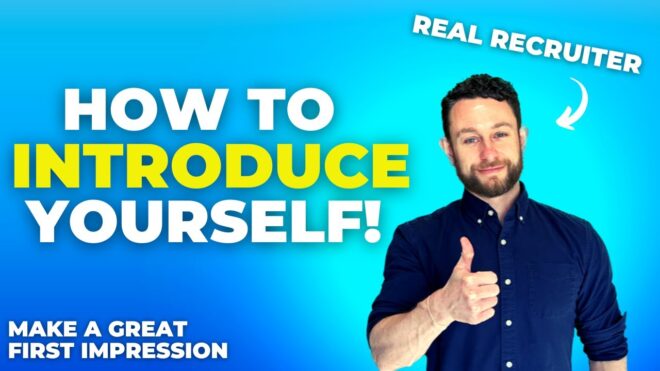Introducing yourself at a job interview can be nerve-wracking. How much should you reveal about yourself? What’s the best way to make a good impression? In this post, we’ll share with you the best strategy for introducing yourself during a job interview. Whether you’re a seasoned professional or a recent grad, these tips will help you showcase your strengths and leave a lasting impression on your prospective employer. Let’s dive in and learn how to ace your next job interview introduction.
How to Introduce Yourself in a Job Interview (The BEST Strategy)
Are you preparing for a job interview and wondering how to make the perfect first impression? Do you struggle with finding the right words to say when introducing yourself in a professional setting? Worry not, this article will guide you on the best strategies to introduce yourself in a job interview.
Introduction
The first few minutes of a job interview are crucial. They can make or break your chances of getting a job. Recruiters form their initial impressions of the candidate during this time. Therefore, it is essential to know how to introduce yourself effectively. Your introduction should be concise, confident, and memorable.
Prepare yourself
Before attending the interview, ensure that you have done your homework. Research the company and the job position you are applying for. Familiarize yourself with the company culture, values, and mission statements. This information will allow you to tailor your introduction to the company’s environment.
Start with a greeting
Upon entering the interview room, greet the interviewer(s) with a confident smile and eye contact. A simple “Good morning/afternoon” followed by your name is an excellent way to start your introduction.
Briefly talk about yourself
Keep your introduction brief, concise, and relevant. Mention your name, education, and work experience. However, avoid reciting your resume. Instead, highlight your skills, accomplishments, and experiences that align with the company’s needs. This approach will demonstrate that you understand the company’s requirements.
Keep it professional
It would help if you sounded professional when introducing yourself. Avoid using slang, jargon, or improper grammar. Speak in a clear and confident tone. Furthermore, ensure that your appearance is professional and matches the company’s dress code.
Show your enthusiasm
Employers want to hire people that are passionate about the job position. Thus, showcase your enthusiasm for the job and the company. Explain why you are excited to work there and your willingness to learn.
Wrap it up with a call to action
Conclude your introduction with a call to action. Express your eagerness to start work and that you are looking forward to discussing the job opportunity further.
Examples of a good introduction
- “Good afternoon, my name is John Doe. I majored in marketing and have spent the last two years working as a marketing assistant. I would love the opportunity to bring my skills to this position and contribute to the company’s growth.”
- “Hello, my name is Jane Smith. I graduated with a degree in biology and have spent the last year working in a research lab. I am excited about the opportunity to utilize my analytical skills to contribute to your team.”
What not to say
Avoid mentioning any negative information about your past work experience or personal life. Also, do not ask about salary, benefits, or vacation time during your introduction. You should also avoid rambling or talking about irrelevant information, as this can make you seem unprofessional.
Tips for improving resumes and finding jobs
Preparing yourself before the interview is only one part of the job search process. Here are some additional tips to consider:
- Create a compelling and concise resume that highlights your skills and achievements.
- Customize your resume to match the job position.
- Use social media to your advantage. Make sure your LinkedIn profile is up-to-date and reflects your professional persona.
- Consider reaching out to recruiters or staffing agencies that specialize in your industry.
- Look for job opportunities in nearby towns or cities if your local area has limited options.
Employer productivity and morale
Employer productivity and morale are crucial aspects of a company’s success. Companies that prioritize their employees’ wellbeing tend to have higher productivity rates and a lower employee turnover rate. As a job seeker, it is essential to research a company’s management style, work culture, and employee benefits. Doing so will provide valuable insights into the company’s work environment and help you decide whether you are a good fit for the company.
FAQs
-
Should I dress up for an interview?
Yes, you should dress professionally for a job interview. Follow the company’s dress code if it is specified. If not, consider wearing a suit or a dress shirt and dress pants. -
Can I use humor in my introduction?
Humor can make you seem personable, but be mindful of the situation. Avoid inappropriate or offensive jokes. -
Is it acceptable to bring up my personal life during the interview?
No, you should avoid mentioning any personal information during an interview. The focus should be on your professional qualifications. -
Should I send a thank-you note after the interview?
Yes, sending a thank-you email or letter after the interview is a good way to show your appreciation and reiterate your interest in the job position. -
Can I negotiate salary during the interview?
Salary negotiations should happen after the interview. Bringing up salary during the introduction can make you seem more focused on money than the job position.
Conclusion
Introducing yourself in a job interview can be daunting, but it is critical to make a good first impression. Prepare yourself by researching the company, dress professionally, and keep your introduction brief and relevant. Demonstrate your passion and enthusiasm for the job, and you will increase your chances of landing the job.
